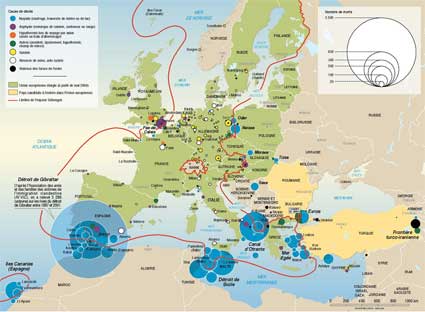An Atlas of Radical Cartography
Posted by Big Gav in maps
I'm always fond of maps and books about maps, so I'll point to WorldChanging's review of An Atlas of Radical Cartography, which looks pretty interesting.
The slipcase contains a set of ten maps and a collection of essays by artists, architects, designers, and writers who illuminate the maps and explore their role as political agent. An Atlas is one of the most intelligent, thought-provoking and original publications i've read in a long long time.
First there is a purely aesthetic pleasure of unfolding the maps and discovering the careful, unique and innovative design of each one.
Then the essays are engrossing. They are written by people who have a story to tell you, they are passionate about it, they are angry or worried by the current state of affair but they are also smart enough to know that the best way to solve a problem is to adopt a pro-active attitude.
Right from the cover, showing an "upside-down"map, we are faced with the fact that even the most banal and innocent-looking map has its own agenda, that it is extremely difficult to separate cartography from politics and ideology. Far from being neutral accessories which would merely help you go from point A to point B, maps are often used as instruments for controlling and shaping beliefs. Conversely, maps can also be at the service of protest and social change. That's what the contributors of the Atlas demonstrate. Deliberately, openly and quite convincingly. ...
The Institute for Applied Autonomy discusses tactical cartography and how locative media technology can be used by activists as cold and precise weapons to foster critical social engagement. They illustrate the concept by detailing their project iSee, a web-based application developed in collaboration with NYCLU and the Surveillance Camera Players to chart the locations of CCTV cameras in Manhattan. By checking iSee, users can find routes that avoid these cameras ("paths of least surveillance") allowing them to walk around their cities without fear of being "caught on tape" by unregulated security monitors. Their essay explains how stories about the iSee application spread all over the media and generated a series of discussions and debates amongst a -so far- unsuspecting audience. The work also extended to camera-mapping workshops which assumed the double role of rendering the proliferation of surveillance cameras tangible to a general audience and creating an empirical basis for challenging policing and public safety policy.
Visible Collective/Naeem Mohaimen interviews Trevor Paglen about his investigation into extraordinary rendition flights, the tension between art and activism as exemplified by a look at Mark Lombardi's drawings and Ashley Hunt's maps, the reasons why cartography shouldn't be confused with geography, etc.






